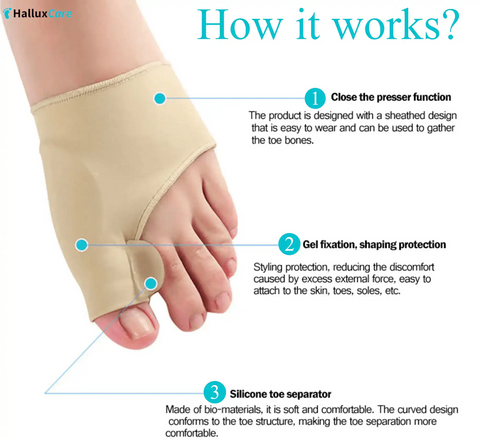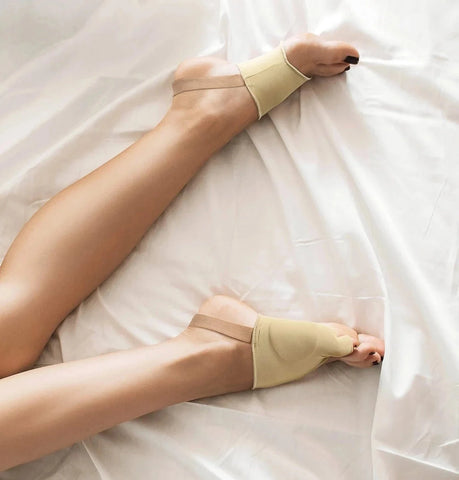Last Updated: April 1st, 2025 • Written by Dr. Sarah Lin, DPM – Board-Certified Podiatrist and Foot Health Educator
Disclaimer: This article is intended for educational and informational purposes only. It is not a substitute for professional medical advice, diagnosis, or treatment. Always consult with a licensed healthcare provider for any foot-related concerns.
Are Your Shoes Hurting Your Feet? You Might Have Bunions
Foot pain isn’t something you should ignore—especially when it affects your daily comfort. Many people dismiss foot discomfort caused by tight or closed shoes, but a consistent bulging at the base of the big toe could be something more serious: bunions. This common foot condition not only alters the shape of your foot but can also lead to chronic pain, mobility issues, and long-term joint damage if left untreated.
What Is a Bunion and Why Does It Hurt?
A bunion, medically known as hallux valgus, is a bony protrusion that forms at the metatarsophalangeal (MTP) joint—where the big toe meets the foot. Over time, the big toe shifts inward toward the second toe, pushing the joint outward and often causing pain, inflammation, and stiffness.
Common symptoms include:
- A visible bump at the side of the big toe
- Redness, tenderness, or swelling at the joint
- Sharp or aching pain, especially in snug footwear
- Limited range of motion in the toe
According to the American College of Foot and Ankle Surgeons (ACFAS), bunions affect approximately 23% of adults aged 18–65 and over 35% of seniors over 65.¹ Not only do they disrupt foot alignment, but they can also interfere with walking, exercise, and even standing for extended periods.
Reddit Speaks: Real Stories from Real People
Online communities like Reddit are full of anecdotal evidence and shared experiences. One user wrote:
“Some people saw my feet and told me to get them checked, especially when I told them the bulging bone below the toe hurts if I wear closed/covered shoes. Have convinced myself since a year now that I have bunions 😅.”
This is a relatable story for many. Unfortunately, self-diagnosis and delayed treatment can lead to worsening symptoms, especially when proper footwear or preventative care is ignored.
4.9 ⭐⭐⭐⭐⭐ ( 1843 reviews )
What Causes Bunions?
While bunions may appear gradually, the underlying causes are often a mix of genetic and environmental factors. According to the American Orthopaedic Foot & Ankle Society (AOFAS), contributing factors include:
- Genetics: Inherited foot shape or joint instability predisposes some people to bunions
- Improper footwear: High heels and narrow, pointed shoes place stress on the forefoot
- Medical conditions: Rheumatoid arthritis and other inflammatory joint issues can accelerate bunion development
- Biomechanical stress: Flat feet, overpronation, or past foot injuries
Why You Shouldn’t Ignore Bunion Pain
Delaying treatment for bunions can result in more than cosmetic concerns. Without intervention, bunions can lead to:
- Chronic pain and inflammation
- Development of overlapping toes or hammertoes
- Restricted mobility and gait changes
- Secondary complications like corns, calluses, or bursitis
Best Non-Surgical Bunion Relief Options
Fortunately, surgery isn’t always necessary. Non-invasive treatments can slow progression and relieve symptoms, especially in the early stages. Recommended by podiatrists, conservative care may include:
- Orthopedic bunion sleeves: Help realign the toe and reduce friction
- Toe spacers or separators: Prevent toes from overlapping
- Topical anti-inflammatories: Pain-relief creams or natural oils soothe sore joints
- Targeted exercises: Strengthen foot muscles and improve flexibility
Why Choose an Orthopedic Bunion Sleeve?
Orthopedic sleeves are an affordable, effective solution for daily relief. They offer:
- Targeted compression: Reduces swelling and supports joint alignment
- Protective gel padding: Reduces shoe pressure and friction
- Comfortable and discreet: Easily worn inside shoes during work or errands
If you're looking for relief from bunion pain, consider using the Orthopedic Bunion Pain Relief & Correction Sleeve , which provides support and helps to alleviate discomfort.
For additional protection, the Tailor's Bunion Bunionette Pain Relief Protection Sleeves are designed to offer comfort and protection for bunionette pain.
To nourish and soothe the skin around bunions, as well as to promote healthy hair, consider the Jamaica Black Castor Oil Soothing Oil . Known for its moisturizing and anti-inflammatory properties, it helps alleviate discomfort around bunions and supports hair growth and scalp health.
When to See a Podiatrist
If home treatments are no longer effective, it’s time to consult a foot specialist. According to the American Podiatric Medical Association (APMA), a podiatrist may offer:
- Custom orthotic devices for better arch and joint support
- Corticosteroid injections to reduce inflammation
- Minimally invasive or surgical correction for severe deformities
Early intervention can prevent worsening symptoms and may eliminate the need for surgery altogether.
Practical Tips for Bunion Prevention and Relief
- Choose shoes with a wide toe box and good arch support
- Avoid heels higher than 2 inches during regular wear
- Use bunion sleeves or toe spacers during long walks or workdays
- Do daily foot stretches to maintain flexibility
Key Takeaways
- Bunions are a common but treatable foot deformity often triggered by poor footwear, genetics, or joint conditions.
- Symptoms include pain, swelling, and a visible bump near the big toe joint.
- Early use of orthopedic devices and proper footwear can prevent progression.
- Consult a podiatrist if symptoms persist or worsen with conservative care.
Frequently Asked Questions (FAQs)
Q: Can bunions go away on their own?
A: No, bunions do not resolve without intervention. However, early treatment can prevent them from worsening. Q: Are bunions hereditary?
A: Yes, genetics play a significant role. Foot shape and joint flexibility are often inherited. Q: Are orthopedic sleeves effective?
A: Yes, when used consistently, they can relieve pain and support toe alignment, especially in early stages. Q: When is surgery necessary?
A: Surgery is typically considered when conservative treatments fail and pain or deformity affects quality of life.
Final Thoughts: Listen to Your Feet
Your feet are foundational to your health and mobility. If you're experiencing bunion pain, don't wait for it to get worse. Early action—whether through footwear changes, orthopedic sleeves, or professional care—can provide meaningful relief.
Have you dealt with bunion pain before? Share your story in the comments to help others find comfort and solutions.
Explore More Bunion Solutions:
- Orthopedic Bunion Pain Relief & Correction Sleeve
- Tailor's Bunion Bunionette Pain Relief Protection Sleeves
- Jamaica Black Castor Oil Soothing Oil
Sources:
- American College of Foot and Ankle Surgeons. “Bunions: Hallux Valgus.” https://www.acfas.org
- American Orthopaedic Foot & Ankle Society. “Bunions.” https://www.aofas.org
- American Podiatric Medical Association. https://www.apma.org




